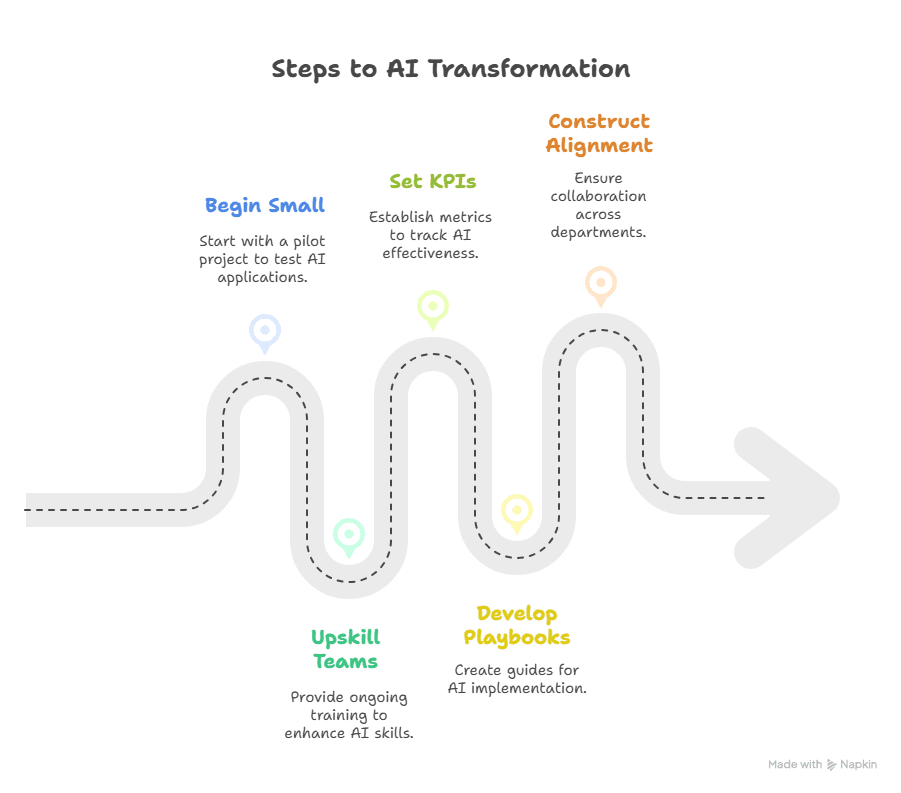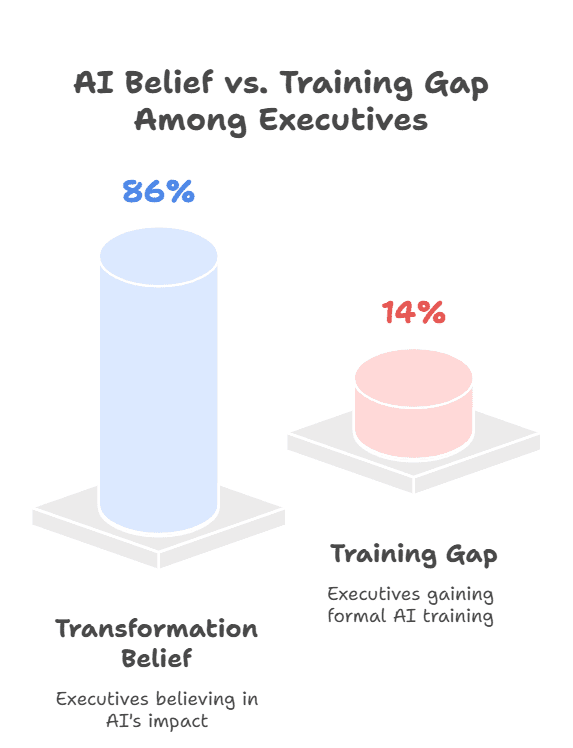In the era of digital disruption, AI for managers is no longer a choice—it’s a necessity. Business environments are transforming rapidly, fueled by the unprecedented potential of artificial intelligence. While data scientists and engineers might spearhead the technical, it’s the managers and executives who are expected to spearhead the charge on strategic execution.
But here’s the rub: most leaders aren’t equipped with AI training.
That’s where PwC’s Generative AI for Managers program comes in. By PwC Academy, it’s an AI course for managers which equips today’s managers with the skills and frameworks necessary to drive AI-first projects with confidence, without having to write a single line of code.
The Rise of AI for Business Decision-Makers
AI isn’t only changing industries—it’s redefining leadership. From healthcare and finance to marketing and logistics, AI is restructuring operations, customer care, and product development.
And here’s the evidence:
92% of Fortune 500 organisations now implement OpenAI products in their business. (Source: Tech Business News)
It’s evident: businesses are investing in AI. But the question is—are their leaders prepared to manage and optimise this investment?
Most aren’t. And that’s precisely why the need for AI skills in business leaders is developing at an exponential rate.
What Is the Generative AI for Managers Program?
This AI program for managers is an executive-level, 4-month online program intended to guide professionals through the strategic and operational aspects of AI. Unlike run-of-the-mill AI courses on technicalities, this program is designed for individuals in decision-making positions.
Whether you are an operations leader, a business leader, or a CXO—this course makes you realise how to leverage Generative AI to drive solutions, increase productivity, and innovate in your area.
Programme Highlights
- PwC Academy’s globally recognised Big Four firm
- Industry mentors and AI experts with live sessions
- 100% online program
- Case-study led and application-focused
- Prestigious Generative AI certificate received on completion
What You’ll Learn
| Module | Focus Area |
| Module 1 | Introduction to Generative AI |
| Module 2 | GenAI in Action: Industry-Specific Applications |
| Module 3 | Bringing GenAI to Life: Project Development |
| Module 4 | The Future of Generative AI |
Who Should Take This AI for Executives Course?
This leadership program of the future is perfect for:
- Department heads looking to include AI in workflows
- Product and operations managers in search of smart automation
- HR and marketing leaders who are investigating AI-powered analytics
- Founders, entrepreneurs, and CXOs who want to create AI-first teams
Whether you’re in fintech, FMCG, healthcare, or B2B SaaS, AI is coming for your processes. Now is the time to take control.
Why Choose This Course Over Others?
There are dozens of online AI courses. So why this one?
Because it’s built for business minds, not tech experts.
While most courses go deep into Python or model architecture, this program is designed for those who ask bigger questions:
How do we leverage AI to enhance our NPS scores?
Can we minimise supply chain backlog with predictive AI?
What are the ethical implications of AI in our customer service platform?
This is not about coding—this is about leading.
Strategic Advantages of Generative AI Training
Completing this PwC AI leadership program provides more than new information. It equips you to:
- Lead cross-functional AI teams with confidence
- Explain AI capabilities and limitations to stakeholders
- Create governance structures for AI ethics
- Examine business cases for AI implementation
- Initiate pilot initiatives that showcase fast returns
It also bridges the cultural divide between technology teams and business units—a significant hindrance to digital transformation initiatives.
Integrating Generative AI Into Business Strategy: Dr. George Westerman
Original Element: The AI Confidence Gap
A Deloitte report indicated that although AI has been widely adopted, just 26% of executives have confidence in handling AI projects.
This knowledge deficit is not because of intellect, but of unstructured exposure.
That’s why the Generative AI for Managers program is important. It doesn’t merely instruct theory—it equips leaders to deploy AI responsibly and strategically.
Practical Implementation Tips Post-Certification
After certification, here’s how managers can lead AI transformation:
- Begin small: Pilot AI for one business unit (e.g., automation of customer support)
- Upskill teams: Internalise learnings from the course
- Set KPIs: Monitor AI adoption via business outcome metrics
- Develop AI playbooks: Define use cases and workflows
- Construct alignment: Get legal, tech, and ops teams working together

FAQs: All You Want to Know
1. What does the Generative AI certificate mean?
It validates that you’ve done hands-on AI training with PwC Academy, and you gain a strategic advantage.
2. Do I need to be able to code?
No. The course is meant for non-technical managers and professionals.
3. How long is the course?
It lasts for 4 months..
4. Can I do this alongside my job?
Yes, the structure is flexible to accommodate working professionals.
5. Is this industry-recognised certification?
Yes, the course is jointly presented by Imarticus and PwC Academy.
6. What kind of assistance can I expect?
Mentorship, live Q&A, and peer-to-peer support through online forums.
7. For which industries is this course most appropriate?
Finance, marketing, logistics, retail, healthcare, and education.
8. What are the hardware requirements?
A reliable internet connection and a laptop or tablet.
Conclusion: Ready to Lead in the Age of AI
AI is revolutionising—but only the players who know the rules will win. The PwC and Imarticus Generative AI for Managers course isn’t merely about AI literacy; it’s about developing the mindset and strategy for confidently leading a data-driven future.
Key Takeaways
- AI for managers is no longer aspirational, but essential for strategic success.
- This Generative AI course is designed specifically for non-technical executives.
- PwC’s AI leadership program bridges the vision and execution gap.
Ready to Lead with AI. Learn more about the program and book your seat today:

